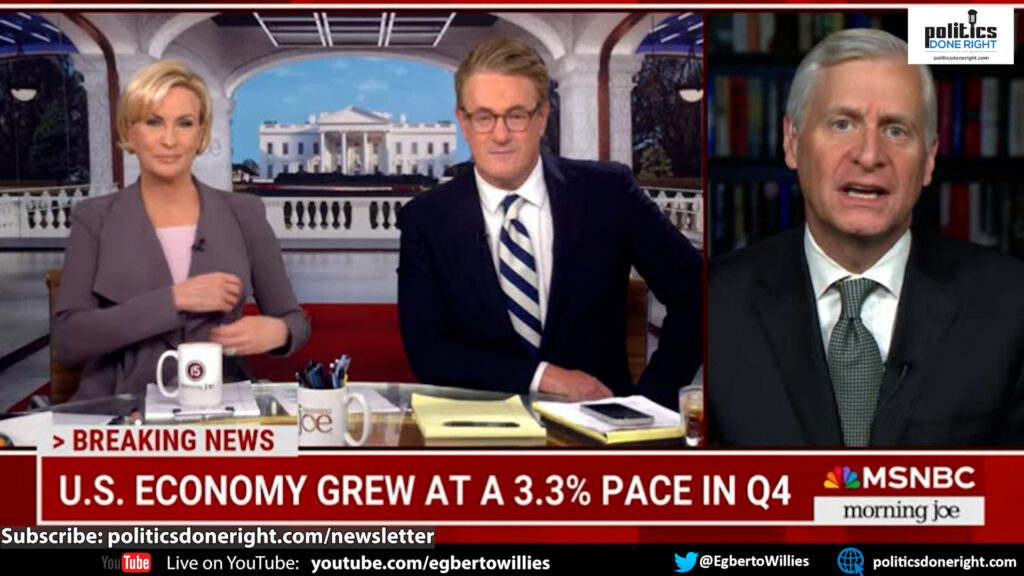Presidential historian Jon Meacham told an inconvenient truth as the panel discussed the better-than-expected economic growth numbers. The economy always does better under Democrats vs Republicans.
Blockbuster report on economy confirms
Podcasts (Video — Audio)
The recent report on the U.S. economy has illuminated a pattern that has long been a subject of debate but is now increasingly clear: the economy of the United States fares better under Democratic administrations than Republican ones. This isn’t a phenomenon confined to the tenure of President Joe Biden; it’s a consistent trend that can be traced back through the administrations of Barack Obama, Bill Clinton, Lyndon B. Johnson, and Jimmy Carter. The evidence is in the numbers – the Gross Domestic Product (GDP) growth, job creation, and overall economic health of the nation have notably improved under Democratic leadership.
The implications of this trend are profound, particularly in the context of the prevailing economic theories and policies. Democrats, traditionally seen as the party more inclined towards social spending and investment in public infrastructure, have a more beneficial impact on the nation’s economy. This starkly contrasts the long-held Republican orthodoxy that favors supply-side economics and significant tax cuts for the wealthy and corporations. The Democratic approach, focusing on stimulating demand by investing in the working and middle classes, enhances the immediate economic well-being of the majority and lays the groundwork for long-term economic stability and growth.
This pattern of economic performance raises critical questions about the underlying economic theories that guide policy decisions. Modern Monetary Theory (MMT) and Keynesian Economics, which advocate for government intervention and spending to stabilize and grow the economy, particularly in times of downturn, seem to align more closely with the approaches taken by Democratic administrations. These theories suggest that injecting money directly into the hands of the working population leads to immediate economic activity and benefits the economy at large. In contrast, the Republican preference for supply-side policies has often been criticized for resulting in wealth accumulation at the top, with a limited trickle-down effect on the broader economy.
Moreover, the Democratic strategy goes beyond mere numbers; it’s intrinsically linked to a vision of a more equitable and just society. Focusing on programs that directly benefit the working and middle classes, such as healthcare, education, and social security, reflects a commitment to reducing inequality and ensuring that the fruits of economic growth are more evenly distributed. This approach fosters a healthier economy and contributes to a more cohesive and stable society.
However, despite these successes, a significant portion of the American population still struggles. Living paycheck to paycheck has become a norm for many, highlighting the structural issues within the economy that need addressing. Progressive voices within the Democratic Party argue that while the party’s economic policies have been beneficial, there is a pressing need to go further. Proposals such as universal basic income, Medicare for All, and stricter regulations on corporate behavior are essential to ensure economic growth and justice.
As the nation moves forward, adopting a holistic approach to economic policymaking becomes increasingly imperative. This involves focusing on growth metrics and ensuring that the benefits of growth are accessible to all. The evidence clarified that Democratic leadership has more effectively managed the economy, but the journey towards a truly equitable and sustainable economic system is ongoing. Progressive activists and policymakers must continue to push for reforms that address the root causes of economic inequality, ensuring that the economy works for everyone, not just the privileged few.
The recent economic report is more than just an assessment of numbers. It’s a testament to the efficacy of progressive economic policies and a call to action for further reforms. As the nation grapples with various economic challenges, the lessons from past administrations offer a blueprint for a more inclusive and prosperous future. The Democratic approach to the economy, rooted in principles of fairness and investment in the public good, has shown its merits. Still, the path ahead requires continued commitment and innovation to build an economy that truly reflects the values and needs of all Americans.
Viewers are encouraged to subscribe and join the conversation for more insightful commentary and to support progressive messages. Together, we can populate the internet with progressive messages that represent the true aspirations of most Americans.

